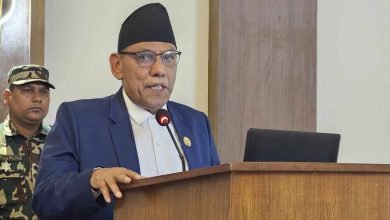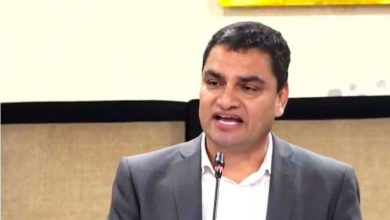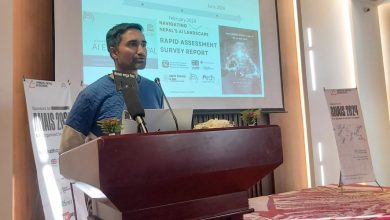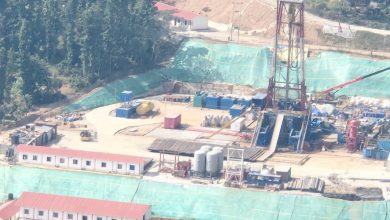Foreign Minister Deuba raises voice about global warming effects facing Nepal
Kathmandu, Dec 9: Minister for Foreign Affairs Dr. Arzu Rana Deuba has raised voice about the rapid effects facing Nepal due to global warming and consequent climate change and the compensation that Nepal should get.
Foreign Minister Deuba emphasized that, despite Nepal’s snow-capped mountains and glaciers playing a crucial role in maintaining climate balance, supporting ecosystems, and preserving biodiversity, they were increasingly threatened by the rapid effects of global warming and consequent climate change.
Foreign Minister Deuba and the members of her delegation delivered Nepal’s oral statement at the International Court of Justice (ICJ) on Monday at the Court’s public hearings on the ‘Obligations of States in respect of Climate Change,’ according to the Ministry of Foreign Affairs.
Speaking before the Court, she stressed, “We are having to bear the brunt of the impacts of climate change in a disproportionate manner. In fact, we are paying for a bad ‘karma’ we did not create”. Furthermore, the foreign minister underscored the vulnerability Nepal faced due to its geographical circumstances and relatively low level of development and made a strong case for climate justice to ameliorate the harsh suffering the climate change has brought to the lives of Nepali people.
She called out the gross injustice that countries like Nepal were experiencing. “We have been penalized for the mistakes we never made, for the crimes we never committed,” she added.
Speaking on human rights law-related obligations of states in connection with climate change, Foreign Minister Deuba highlighted Nepal’s position that many vulnerable states were not able to meet the obligations under international human rights law as the actions and emissions arising from beyond their territory also had effects on the specific rights of their citizens.
Similarly, Nepal’s position on the other aspects of state obligations regarding climate change was presented by the secretary of the Ministry of Law, Justice, and Parliamentary Affairs, Udaya Raj Sapkota. Sapkota underscored that the general obligation to prevent transboundary harm, based on the concept of due diligence, was a well-established rule in international law, adding that such an obligation was applicable in the context of climate change as well.
He further clarified Nepal’s position on the ‘differentiated’ nature of obligations based on treaties related to climate change. Sapkota also called for considering specific vulnerabilities of landlocked and mountainous countries as well as overall economic capabilities and constraints while applying the principle of differentiated obligations.
Nepal also stressed the duty of assistance, where the developed countries have an obligation under the Paris Agreement to provide financial resources for assisting developing countries in mitigation and adaptation. “Under this duty of assistance, developed states have an obligation to support the neediest among the developing countries—the least developed, small islands, and mountainous countries,” he stated.
In Nepal’s third and last oral statement, Suvanga Parajuli, Under-Secretary, Ministry of Foreign Affairs, spoke on the legal consequences when the states fail to uphold the obligations regarding climate change. Parajuli refuted the characterization of the climate crisis as a “collective tragedy where no specific responsibility could be assigned.”.
He argued that the responsibilities could be established based on the customary international law on the responsibility of states regarding internationally wrongful acts, adding that the developed countries have a collective duty to compensate for the harm caused by their historic emissions given the composite nature of state responsibility in climate change.
“What countries like Nepal are calling for is not mere handouts or charity but compensatory climate justice,” he said. The oral proceedings are being held at the seat of the Court in The Hague, the Netherlands, from December 2 to 12.
The International Court of Justice (ICJ), the Permanent Court of the United Nations, which has 15 judges elected for nine-year terms, handles two types of proceedings: contentious cases (settling legal disputes between states) and advisory proceedings (providing legal opinions based on the request by the UN).
The ongoing proceedings are of an advisory nature, which will help clarify the legal questions posed before the Court by the UN General Assembly on 29 March 2023. Current hearings are instituted by the Court pursuant to the United Nations General Assembly Resolution A/RES/77/276, of 29 March 2023.
The resolution, of which Nepal was also one of the co-sponsors, requested the Court to render an advisory opinion on the obligations of States regarding climate change. This is also the first case where the General Assembly requested the Court’s advisory opinion through a consensus resolution.
Foreign Minister Deuba’s participation at the ongoing hearing is the first-ever participation of Nepal in the ICJ. This reflects the urgency Nepal attaches to the question of climate justice, adds the Ministry. —RSS









Comments